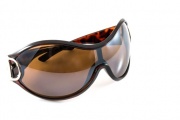Most people know that ultraviolet (UV) light can cause premature aging of the skin, sunburn and some skin cancers, but UV is also dangerous to the eyes.
Aside from the skin damage that occurs in the sensitive eyelids, UV radiation has been found to be a significant factor in the development of cataracts, as well as progression of age-related macular degeneration, a leading cause of blindness. In addition, UV is an underlying cause of certain types of exposure damage to the conjunctiva in the formation of small growths called pingueculas, and larger, wedge-shaped plaques known as pterygiums. UV exposure can also cause a condition called photokeratitis, which is the medical term for an ocular sunburn. The skin covering the cornea and the conjunctiva are sensitive to damage from the same rays that cause skin sunburn elsewhere, because they are essentially specialized skin cells and are susceptible to the same kinds of changes as seen in the skin anywhere else on the body. Both UV-A and UV-B rays are implicated in these conditions.
UV light is part of the radiation spectrum and is not visible to humans. Because UV rays have more energy than visible light, they can penetrate the ocular tissues more easily, where they can damage the crystalline lens and the retina.
There is no proven benefit to UV light rays. Full-spectrum lighting, which is largely a marketing term without regulation, may not differ substantially from ordinary lighting. A study done by the non-profit Lighting Research Center, showed that full-spectrum light does not provide any improved benefits over similar light systems using ordinary cool-white fluorescent lighting or other incandescent lights.
UV radiation has recently been used in the bleaching of teeth, where it supposedly enhances the whitening power of the bleaching agent . Studies have now shown that there is no added benefit at all to using UV to enhance whitening of the teeth, and that in fact it causes more damage in the form of grooves on the enamel surface, which makes them more vulnerable to mechanical stress. UV light does not act as a catalyst for the bleaching agent to work; all it does is expose your lips, gums, facial skin and eyes to damaging, high-energy light.
Prevention is Best
Once UV-related changes begin to appear, the best course of action is to prevent progression and further damage. Damage to the eyes happens gradually and is not reversible; because of this, it is important to protect the eyes from UV light from a very young age.
Usually, we think of eye protection as impact resistance, but it also refers to UV blocking. Children should wear good-quality sunglasses that block UV and wear a hat with a broad brim in front to prevent UV from getting to the eyes. Children spend more time outside and are therefor more vulnerable to cumulative damage from UV. Like the use of seat belts, it is important to protect the eyes every time they would be exposed to the sun; the best way is to make eye protection a habit.
The photo shows four keys to UV protection: scarf, hat, sunblock and sunglasses.
Good sunglasses can be much more than just a fashion statement; they can be essential for long-term eye health.
Choose sun eyewear that blocks at least 99% of UV light and keep in mind that lenses that wrap-around the face will be more effective, particularly from reflected light off water or snow. It is important to know, however, that labelling standards for sunglasses are voluntary, but are left to the manufacturer. Also, the darkness of the tint does not reflect how well the glasses block UV; the UV protection is provided by an invisible protective coat applied during manufacturing. Adding UV protection later is not effective.
Ironically, sunglasses that haven’t been treated for UV protection may be even more harmful than no lenses at all. This is because the dark lenses cause the pupils to dilate, which allows more UV to move into the eye.
All optical plastic and high-index glass lenses at our office have UV protection that does block 100% of UV radiation. Because we feel that our patients should not be without this valuable protection, we do not charge for the UV-blocking coating.







